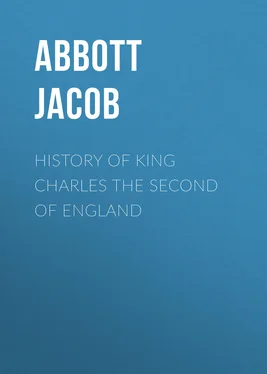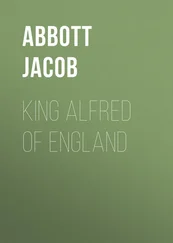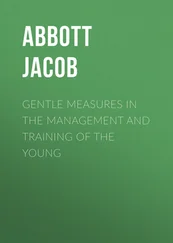Jacob Abbott - History of King Charles the Second of England
Здесь есть возможность читать онлайн «Jacob Abbott - History of King Charles the Second of England» — ознакомительный отрывок электронной книги совершенно бесплатно, а после прочтения отрывка купить полную версию. В некоторых случаях можно слушать аудио, скачать через торрент в формате fb2 и присутствует краткое содержание. Жанр: foreign_prose, foreign_antique, на английском языке. Описание произведения, (предисловие) а так же отзывы посетителей доступны на портале библиотеки ЛибКат.
- Название:History of King Charles the Second of England
- Автор:
- Жанр:
- Год:неизвестен
- ISBN:нет данных
- Рейтинг книги:4 / 5. Голосов: 1
-
Избранное:Добавить в избранное
- Отзывы:
-
Ваша оценка:
- 80
- 1
- 2
- 3
- 4
- 5
History of King Charles the Second of England: краткое содержание, описание и аннотация
Предлагаем к чтению аннотацию, описание, краткое содержание или предисловие (зависит от того, что написал сам автор книги «History of King Charles the Second of England»). Если вы не нашли необходимую информацию о книге — напишите в комментариях, мы постараемся отыскать её.
History of King Charles the Second of England — читать онлайн ознакомительный отрывок
Ниже представлен текст книги, разбитый по страницам. Система сохранения места последней прочитанной страницы, позволяет с удобством читать онлайн бесплатно книгу «History of King Charles the Second of England», без необходимости каждый раз заново искать на чём Вы остановились. Поставьте закладку, и сможете в любой момент перейти на страницу, на которой закончили чтение.
Интервал:
Закладка:
The names and ages of the queen's children at this time were as follows:
Charles, prince of Wales, the subject of this story, eleven.
Mary, ten. Young as she was, she was already married, having been espoused a short time before to William, prince of Orange, who was one year older than herself.
James, duke of York, seven. He became afterward King James II.
Elizabeth, six.
Henry, an infant only a few months old.
The night passed away without any attack, though a considerable force assembled in the vicinity, which was, however, soon after disbanded. The queen's fears were, nevertheless, not allayed. She began to make arrangements for escaping from the kingdom in ease it should become necessary to do so. She sent a certain faithful friend and servant to Portsmouth with orders to get some vessels ready, so that she could fly there with her children and embark at a moment's notice, if these dangers and alarms should continue.
She did not, however, have occasion to avail herself of these preparations. Affairs seemed to take a more favorable turn. The king came back from Scotland. He was received by his people, on his arrival, with apparent cordiality and good will. The queen was, of course, rejoiced to welcome him home, and she felt relieved and protected by his presence. The city of London, which had been the main seat of disaffection and hostility to the royal family, began to show symptoms of returning loyalty and friendly regard. In reciprocation for this, the king determined on making a grand entry into the city, to pay a sort of visit to the authorities. He rode, on this occasion, in a splendid chariot of state, with the little prince by his side. Queen Henrietta came next, in an open carriage of her own, and the other children, with other carriages, followed in the train. A long cortege of guards and attendants, richly dressed and magnificently mounted, preceded and followed the royal family, while the streets were lined with thousands of spectators, who waved handkerchiefs and banners, and shouted God save the king! In the midst of this scene of excitement and triumph, Henrietta rode quietly along, her anxieties relieved, her sorrows and trials ended, and her heart bounding with happiness and hope. She was once more, as she conceived, reunited to her husband and her children, and reconciled to the people of her realm. She thought her troubles were over Alas! they had, on the contrary, scarcely begun.
CHAPTER II
PRINCE CHARLES'S MOTHER
The indications and promises of returning peace and happiness which gave Prince Charles's mother so much animation and hope after the return of her husband from Scotland were all very superficial and fallacious. The real grounds of the quarrel between the king and his Parliament, and of the feelings of alienation and ill will cherished toward the queen, were all, unfortunately, as deep and extensive as ever; and the storm, which lulled treacherously for a little time, broke forth soon afterward anew, with a frightful violence which it was evident that nothing could withstand. This new onset of disaster and calamity was produced in such a way that Henrietta had to reproach herself with being the cause of its coming.
She had often represented to the king that, in her opinion, one main cause of the difficulties he had suffered was that he did not act efficiently and decidedly, and like a man, in putting down the opposition manifested against him on the part of his subjects; and now, soon after his return from Scotland, on some new spirit of disaffection showing itself in Parliament, she urged him to act at once energetically and promptly against it. She proposed to him to take an armed force with him, and proceed boldly to the halls where the Parliament was assembled, and arrest the leaders of the party who were opposed to him. There were five of them who were specially prominent. The queen believed that if these five men were seized and imprisoned in the Tower, the rest would be intimidated and overawed, and the monarch's lost authority and power would be restored again.
The king was persuaded, partly by the dictates of his own judgment, and partly by the urgency of the queen, to make the attempt. The circumstances of this case, so far as the action of the king was concerned in them, are fully related in the history of Charles the First. Here we have only to speak of the queen, who was left in a state of great suspense and anxiety in her palace at Whitehall while her husband was gone on his dangerous mission.
The plan of the king to make this irruption into the great legislative assembly of the nation had been kept, so they supposed, a very profound secret, lest the members whom he was going to arrest should receive warning of their danger and fly. When the time arrived, the king bade Henrietta farewell, saying that she might wait there an hour, and if she received no ill news from him during that time, she might be sure that he had been successful, and that he was once more master of his kingdom. The queen remained in the apartment where the king had left her, looking continually at the watch which she held before her, and counting the minutes impatiently as the hands moved slowly on. She had with her one confidential friend, the Lady Carlisle, who sat with her and seemed to share her solicitude, though she had not been entrusted with the secret. The time passed on. No ill tidings came; and at length the hour fully expired, and Henrietta, able to contain herself no longer, exclaimed with exultation, "Rejoice with me; the hour is gone. From this time my husband is master of his realm. His enemies in Parliament are all arrested before this time, and his kingdom is henceforth his own."
It certainly is possible for kings and queens to have faithful friends, but there are so many motives and inducements to falsehood and treachery in court, that it is not possible, generally, for them to distinguish false friends from true. The Lady Carlisle was a confederate with some of the very men whom Charles had gone to arrest. On receiving this intimation of their danger, she sent immediately to the houses of Parliament, which were very near at hand, and the obnoxious members received warning in time to fly. The hour had indeed elapsed, but the king had met with several unexpected delays, both in his preparations for going, and on his way to the House of Commons, so that when at last he entered, the members were gone. His attempt, however, unsuccessful as it was, evoked a general storm of indignation and anger, producing thus all the exasperation which was to have been expected from the measure, without in any degree accomplishing its end. The poor queen was overwhelmed with confusion and dismay when she learned the result. She had urged her husband forward to an extremely dangerous and desperate measure, and then by her thoughtless indiscretion had completely defeated the end. A universal and utterly uncontrollable excitement burst like a clap of thunder upon the country as this outrage, as they termed it, of the king became known, and the queen was utterly appalled at the extent and magnitude of the mischief she had done.
The mischief was irremediable. The spirit of resentment and indignation which the king's action had aroused, expressed itself in such tumultuous and riotous proceedings as to render the continuance of the royal family in London no longer safe. They accordingly removed up the river to Hampton Court, a famous palace on the Thames, not many miles from the city. There they remained but a very short time. The dangers which beset them were evidently increasing. It was manifest that the king must either give up what he deemed the just rights and prerogatives of the crown, or prepare to maintain them by war. The queen urged him to choose the latter alternative. To raise the means for doing this, she proposed that she should herself leave the country, taking with her, her jewels, and such other articles of great value as could be easily carried away, and by means of them and her personal exertions, raise funds and forces to aid her husband in the approaching struggle.
Читать дальшеИнтервал:
Закладка:
Похожие книги на «History of King Charles the Second of England»
Представляем Вашему вниманию похожие книги на «History of King Charles the Second of England» списком для выбора. Мы отобрали схожую по названию и смыслу литературу в надежде предоставить читателям больше вариантов отыскать новые, интересные, ещё непрочитанные произведения.
Обсуждение, отзывы о книге «History of King Charles the Second of England» и просто собственные мнения читателей. Оставьте ваши комментарии, напишите, что Вы думаете о произведении, его смысле или главных героях. Укажите что конкретно понравилось, а что нет, и почему Вы так считаете.












